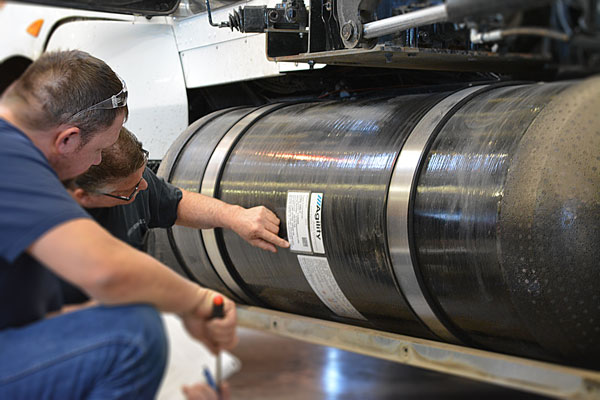Has your team ever confused the CNG Detailed Visual Inspection with the FMCSA Annual Inspection? On paper, it might sound like a reasonable mistake, but the reality is far from it. Below are three (3) reasons why FMCSA is no substitute for CNG, and why it is imperative that you have your technicians follow the correct procedures when evaluating any CNG vehicle.
The inspection points are different
The Federal Motor Carrier Safety Administration’s annual inspection was originally designed for diesel vehicles, and only addresses three questions regarding that fuel system:
- Are there visible leaks?
- Is the fuel tank cap missing?
- Is the fuel tank securely attached?
As for CNG vehicles? The Detailed Visual Inspection form just for the fuel system is two pages long — and includes these components:
- Fuel Receptacle
- Secondary Check Valve
- Defueling Valve and Receptacle
- Fittings, Tubing and Lines
- Cylinder(s), Shields, Mounting System
- Cylinder Valve(s)
- PRD(s), Vent Tubing and Caps
- Fuel System Isolation Valve
- High-Pressure Coalescing Filter
- Fuel System Isolation Solenoid Valve
- Mechanical Pressure Gauge
- Fuel Shutoff Solenoid Valve
- Pressure Regulator
- Required labels
Why are CNG inspections so thorough? First, natural gas is a high-pressure fuel. Second, it is stored and delivered through a fuel system that is complex and potentially dangerous when not assessed properly.
The inspector qualifications are different
Qualifying as a DOT inspector does not qualify a technician to inspect natural gas vehicles. CNG fuel system inspector training is more specialized and rigorous because it deals with pressurized vessels, and optional certification must be renewed every five (5) years.
At minimum, a CNG inspector must possess 1) the highest measurable knowledge of the function, normal state, and inspection requirements of every CNG fuel system component, as well as all codes and standards; and 2) the highest measurable skill in preparing for inspections, utilizing the proper tools, identifying all components, applying those codes and standards, detecting, measuring, and classifying cylinder damage.
The inspector training is different
If this all sounds like a lot, that’s because it is. We can’t stress enough how critical your technicians’ knowledge is for the safety of every CNG fleet, from its drivers and customers to the general public — to your technicians themselves!
Maintaining the highest levels of knowledge and skill mentioned above can only come from a deep understanding of these CNG concepts and requirements. And that’s where we come in. NGVi is the only ASE-accredited training provider in the alternative fuels industry, even endorsed by CNG fuel system manufacturers:
Agility recommends inspection and service technicians receive training and certification by third-party organizations such as…NGVi (Natural Gas Vehicle Institute).
Agility ENP 558 Rev F – page 7
1.7 CNG Inspectors: Certified vs Qualified
If your technicians need training, take a look at our available live virtual courses and let us know what questions you have.

